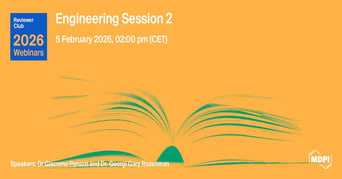- 2.8Impact Factor
- 5.0CiteScore
- 17 daysTime to First Decision
News & Conferences
Latest News & Announcements
Latest Conferences
Propose a Conference Collaboration
Promote and publicise your upcoming conference with MDPI.
All News & Conferences
News & Announcements
MDPI INSIGHTS: The CEO’s Letter #32 - MDPI China and Thailand, China Science Daily, 1,000 Partnerships, R2R
28 February 2026
News & Announcements
Interview with Dr. Ioannis Karagiorgos—Winner of the Journal of Marine Science and Engineering Travel Award
26 February 2026
News & Announcements
Interview with Dr. Enrico Montalbetti—Winner of the Journal of Marine Science and Engineering Travel Award
26 February 2026
News & Announcements
Journal of Marine Science and Engineering | Issue Cover Collection Published in 2025
24 February 2026
News & Announcements
MDPI Virtual Academic Publishing Workshop (New Harvest), 25 February 2026
20 February 2026
News & Announcements
MDPI’s Open Access Program Reaches 1,000 Institutions Worldwide
18 February 2026
News & Announcements
Acknowledgment to the Reviewers of Journal of Marine Science and Engineering (JMSE) in 2025
4 February 2026
News & Announcements
MDPI INSIGHTS: The CEO's Letter #31 - MDPI 30 Years, 500 Journals, UK Summit, Z-Forum Conference, APE
2 February 2026
5 - 5 February 2026
News & Announcements
MDPI Reviewer Club Webinar 2026 | Engineering Session 2, 5 February 2026
29 January 2026
News & Announcements
Meet Us at the Ocean Sciences Meeting 2026, 22–27 Febuary 2026, Glasgow, UK
23 January 2026
News & Announcements
International Day of Clean Energy—“Clean Energy: For All and for Our Planet”, 26 January 2026
23 January 2026
of 21











.jpg?v=1769683508)
